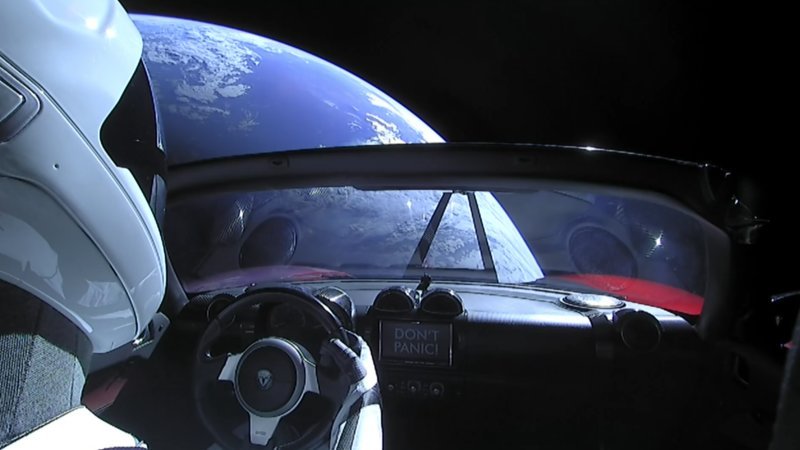Elon Musk’s Tesla Roadster isn't going to hold up well in outer space

You remember him; the dummy at the helm of a midnight cherry-colored Tesla Roadster that is careening from Earth's orbit, thanks to yesterday's SpaceX launch of the Falcon Heavy rocket, its biggest yet.
It's the first-ever payload launch demonstration for Elon Musk's super-rocket, which lifted off from the Kennedy Space Center at Cape Canaveral, Fla. Tuesday thanks to more than 5 million pounds of thrust. It'll whisk Starman and his sports car at 7 miles per second, or 25,200 miles per hour, through the solar system.
It's a hugely impressive feat, especially considering Musk himself gave the whole launch 50-50 odds of succeeding. True, the rocket thruster overshot its original Mars trajectory, and Starman is instead headed to the asteroid belt between Mars and Jupiter. But that's still cool, and we can only hope that the cameras and video monitors affixed to the automotive space capsule survive long enough to send us images, because scientists say the car itself is in for a rough time in the conditions found in outer space.
That's because space is filled with solid objects — especially micrometeorites — and radiation. The risks posed by the former are self-explanatory, especially given the length of time the rocket will be traveling through space. But the latter has to do with the lack of radiation-filtering that we Earthlings enjoy, thanks to our atmosphere, deep in space. That's bad news for things like the Roadster's various plastic components, its leather, exterior paint, and rubber tires.
"All of the organics will be subjected to degradation by the various kinds of radiation that you will run into there," William Carroll, a chemist at Indiana University who studies plastics and organic molecules, tells Live Science. Even the Roadster's carbon-fiber frame will be stressed, he said, as energy from stellar radiation slowly causes the carbon-carbon and carbon-hydrogen bonds to snap, making the car to fall to bits.
"Those organics, in that environment, I wouldn't give them a year," Carroll added.
What's likely to survive longest will be the Roadster's inorganic components, like the aluminum chassis, the lithium-ion battery pack and any glass that doesn't get shattered by meteors.
Meanwhile, Musk saw fit to include several fun novelties in the Roadster, including a circuit board bearing the phrase "Made on Earth by humans," a toy Roadster mounted to the dashboard, and the phrase "Don't Panic!" on the center screen. That's a reference to the 1979 novel "The Hitchhiker's Guide to the Galaxy" by Douglas Adams about an accidental space traveler named Arthur Dent. Musk is known for his love of science fiction and even acknowledged naming the SpaceX Falcon series of rockets after the Millennium Falcon of Star Wars fame.
Related News
